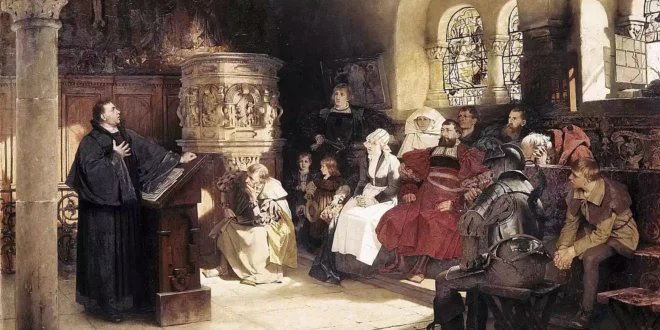Hanne Nabintu Herland sees ‘destructive side effect’ of 16th century Reformation: The early division between Catholics and Protestants began in 1517, when Martin Luther (1483-1546) started a popular uprising, delivering the 95 theses in Wittenberg, Germany.
Protestantism and Martin Luther: He criticized the Catholic clergy for placing a monetary price on forgiveness and the path to heaven. Luther’s point was that a politicized church more eager to make money than reflect the spiritual message of Christianity, is of no use. He claimed that the grace of God is the only remedy that saves a human soul.
As a result of the strong reaction to his criticism of the corruption within the Catholic church, he was banned by the Pope as a heretic, and had to flee to the mountains, writes Hanne Nabintu Herland, historian of comparative religions, author and founder of The Herland Report. The article first appeared at WND. (Feature: Martin Luther preaches in Wartburg. By Hugo Vogel)

Protestantism and Martin Luther: One of the destructive side effects of the birth of Protestantism was that it effectively caused a deep division within the Church, which later was used politically to instigate a major division in Western Christianity.
Many have since lamented the divide that took place and wish that the Church should have been reformed, yet remained united.
The religious divisions grew into intricate systems of belief that differed, often only, in views such as how to baptize, or who was to receive Holy Communion, how to practice the liturgy and so on.
The Protestant Church lost, in many ways, touch with the Orthodox and Catholic Church history of the early Church fathers, and thus its own heritage before Luther in 1517.
RELATED ARTICLES:
- The Protestant and Catholic Church: From Division to Communion Vatican II
- Christian Values formed Western Civilization: Equality, individualism, empathy, human dignity
- The Conservative philosopher Edmund Burke: We need to resist the passionate calls for revolution
- Lack of Morality creates Western Downfall: The greatest failing in modern Western thought is the lack of a basic common moral understanding
Protestantism and Martin Luther: The old saying “divide and conquer” seems to have plagued the Protestant Church ever since, fueling strife and regrouping, splitting churches and steadily forging new denominations with often pompous pastors at the top. The lack of united leadership and regulation in its ranks has been quite convenient for its atheist opponents.
It is not too hard to conquer a church that is already divided, the pastors quarrelling among themselves about theological details. In many cities this is reflected, when driving, by the passing of church after church, many divided into small groups that are not even talking to or visiting each other.
Martin Luther’s protest may have been legitimate, yet his legacy also contributed to the Protestant disconnection to early Church history. Protestants increasingly lost the Catholic knowledge about the early saints, the holy men and women who lived in the early centuries after Christ.
Yet, this part of history is, until this day, vividly kept alive in the Orthodox Church, where the traditions of adorning the church buildings with beauty and icons reflect the unity with the eternal body of Christ, the communion between the living and the holy people in history.
Protestantism also brought constructive elements such as a strong belief in man’s personal link to God. To believe in God is a personal relationship as well as a church fellowship. Man was to work hard and prove his abilities; he was to care for the community and show his love for God in this way.
Author Rodney Stark describes in Victory of Reason. How Christianity led to Freedom, Capitalism and Western Success how the rational elements of Protestant Christianity were a prerequisite for capitalism’s focus on individual freedom, thus forming the initial success of Western Christianity and culture as a whole.
Minister John Calvin (1509-1564) in Switzerland focused on hard work and a strong morality as the main service to God. At the time, the city of Geneva was rife with prostitution, crime, chaos, and destitution. Calvin worked hard to strengthen the morale and reform society to the better, speaking about boundary setting, self-control, selflessness and discipline.
Protestantism and Martin Luther: Calvin believed that the actions of believers should correspond to ethics that produced stability in society, peace and order. In turn, this would lead to a constructive development built on the respect for God’s commandments as a set of regulations that would provide justice to all – and form the basis for the elimination of poverty. As Victor Hugo, the author of Les Misérables said, “To love another person is to see the face of God.”
It is remarkable how focused the early Protestants were on helping the poor and laying a foundation for a society based on a strong work ethic, dignity, and self-respect. Until this day, Switzerland is marked by the values that once made John Calvin such a noteworthy Christian reformer.
One of the most important writers of the 1900s, C.S. Lewis (1898-1963), was always focusing on the common ground upon which the Christian denominations stand. In Mere Christianity, he states that the reader will not learn from him how to become Anglican, Methodist, Presbyterian or Catholic. What he wanted to accomplish with his famous book, was to explain and defend the belief that has been common to all Christians in history, regardless of denominations.









